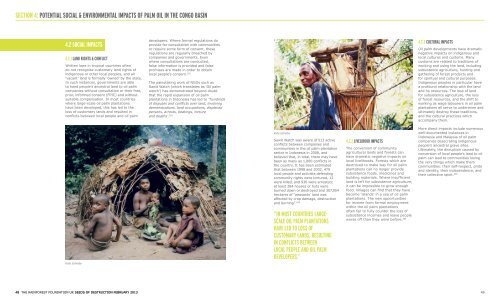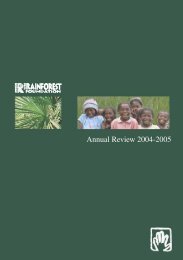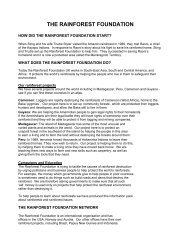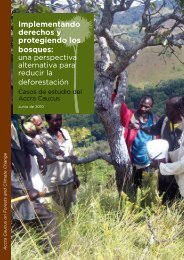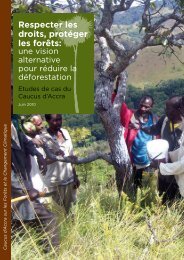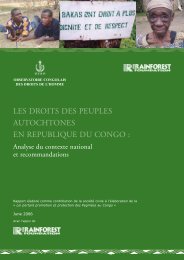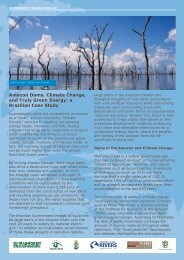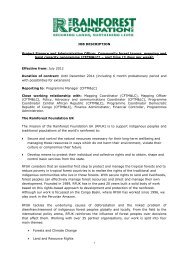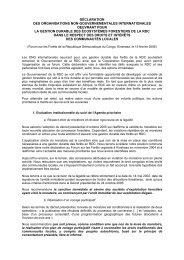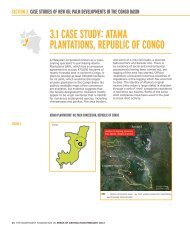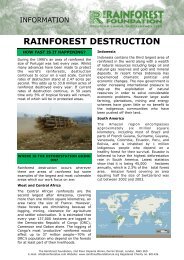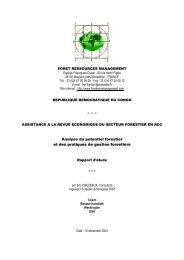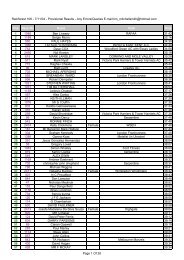Seeds of Destruction - Rainforest Foundation UK
Seeds of Destruction - Rainforest Foundation UK
Seeds of Destruction - Rainforest Foundation UK
You also want an ePaper? Increase the reach of your titles
YUMPU automatically turns print PDFs into web optimized ePapers that Google loves.
SECTION 4: POTENTIAL SOCIAL & ENVIRONMENTAL IMPACTS OF PALM OIL IN THE CONGO BASIN<br />
4.2 SOCIAL IMPACTS<br />
4.2.1 LAND RIGHTS & CONFLICT<br />
Written laws in tropical countries <strong>of</strong>ten<br />
do not recognise customary land rights <strong>of</strong><br />
indigenous or other local peoples, and all<br />
‘vacant’ land is formally ‘owned’ by the state.<br />
In such instances, governments are able<br />
to hand people’s ancestral land to oil palm<br />
companies without consultation or their free,<br />
prior, informed consent (FPIC) and without<br />
suitable compensation. In most countries<br />
where large-scale oil palm plantations<br />
have been developed, this has led to the<br />
loss <strong>of</strong> customary lands and resulted in<br />
conflicts between local people and oil palm<br />
developers. Where formal regulations do<br />
provide for consultation with communities<br />
or require some form <strong>of</strong> consent, these<br />
regulations are regularly breached by<br />
companies and governments. Even<br />
where consultations are conducted,<br />
false information is provided and false<br />
promises are made in order to obtain<br />
local people’s consent. 202<br />
The painstaking work <strong>of</strong> NGOs such as<br />
Sawit Watch (which translates as ‘Oil palm<br />
watch’) has demonstrated beyond doubt<br />
that the rapid expansion <strong>of</strong> oil palm<br />
plantations in Indonesia has led to “hundreds<br />
<strong>of</strong> disputes and conflicts over land, involving<br />
demonstrations, land occupations, displaced<br />
persons, arrests, beatings, torture<br />
and deaths’. 203<br />
4.2.3 CULTURAL IMPACTS<br />
Oil palm developments have dramatic<br />
negative impacts on indigenous and<br />
local cultures and customs. Many<br />
customs are related to traditions <strong>of</strong><br />
working and using the land, including<br />
subsistence agriculture, hunting and<br />
gathering <strong>of</strong> forest products and<br />
for spiritual and cultural purposes.<br />
Indigenous peoples in particular have<br />
a pr<strong>of</strong>ound relationship with the land<br />
and its resources. The loss <strong>of</strong> land<br />
for subsistence agriculture, the loss<br />
<strong>of</strong> forest resources, and the shift to<br />
working as wage labourers in oil palm<br />
plantations all serve to undermine and<br />
ultimately destroy these traditions,<br />
and the cultural practices which<br />
accompany them.<br />
Kate Eshelby<br />
Kate Eshelby<br />
Sawit Watch was aware <strong>of</strong> 513 active<br />
conflicts between companies and<br />
communities in the oil palm plantation<br />
sector in Indonesia in 2008, and<br />
believed that, in total, there may have<br />
been as many as 1,000 conflicts in<br />
the country. It has been estimated<br />
that between 1998 and 2002, 479<br />
local people and activists defending<br />
community rights were tortured, 12<br />
were killed, and 936 were arrested;<br />
at least 284 houses or huts were<br />
burned down or destroyed and 307,954<br />
hectares <strong>of</strong> “peasants’ land was<br />
affected by crop damage, destruction<br />
and burning”. 204<br />
“IN MOST COUNTRIES LARGE-<br />
SCALE OIL PALM PLANTATIONS<br />
HAVE LED TO LOSS OF<br />
CUSTOMARY LANDS, RESULTING<br />
IN CONFLICTS BETWEEN<br />
LOCAL PEOPLE AND OIL PALM<br />
DEVELOPERS.”<br />
4.2.2 LIVELIHOOD IMPACTS<br />
The conversion <strong>of</strong> community<br />
agricultural lands and forests can<br />
have dramatic negative impacts on<br />
local livelihoods. Forests which are<br />
destroyed to make way for oil palm<br />
plantations can no longer provide<br />
subsistence foods, medicines and<br />
building materials. Where insufficient<br />
land is left for subsistence agriculture,<br />
it can be impossible to grow enough<br />
food. Villages can find that they have<br />
become ‘islands’ in a sea <strong>of</strong> oil palm<br />
plantations. The new opportunities<br />
for income from formal employment<br />
within the oil palm plantations<br />
<strong>of</strong>ten fail to fully counter the loss <strong>of</strong><br />
subsistence incomes and leave people<br />
worse <strong>of</strong>f than they were before. 205<br />
More direct impacts include numerous<br />
well-documented instances in<br />
Indonesia and Malaysia <strong>of</strong> oil palm<br />
companies desecrating indigenous<br />
people’s ancestral grave sites.<br />
Ultimately, the disruption caused by<br />
conversion <strong>of</strong> local people’s land to oil<br />
palm can lead to communities losing<br />
the very things which make them<br />
communities: their self-respect, pride<br />
and identity, their independence, and<br />
their collective spirit. 206<br />
48 THE RAINFOREST FOUNDATION <strong>UK</strong> SEEDS OF DESTRUCTION FEBRUARY 2013 49


